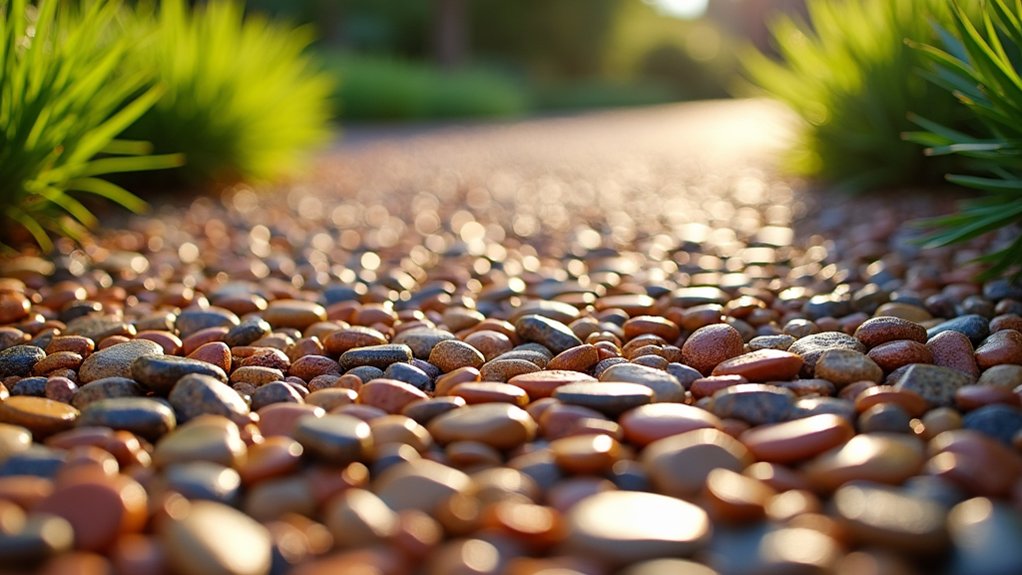A well-installed resin-bound gravel surface lasts between 15 to 25 years. The lifespan largely depends on three key factors: material quality, professional installation and proper upkeep. Premium resins and carefully selected aggregates boost durability significantly. Regular maintenance, including routine sweeping and occasional pressure washing, keeps the surface in top condition. Much like a garden patio or driveway, the better you look after it, the longer it will serve you. This robust surface proves particularly suitable for British weather conditions, handling both summer heat and winter frost when properly installed.
Key Takeaways
Resin-bound gravel surfaces last between 15 and 25 years, though premium materials can stretch this to 30 years – about the same lifespan as a quality conservatory.
Getting the installation right is vital – always use qualified UK contractors who specialise in resin driveways. Think of it like laying a new kitchen floor; proper groundwork makes all the difference.
Basic upkeep is straightforward: regular brushing and an annual pressure wash will keep your surface in top nick. It’s similar to maintaining a garden patio.
British weather plays a big part in how long your surface lasts. Strong sunlight, heavy rain and proper drainage all affect durability, so choosing UV-resistant resins is worth the extra cost.
Top-quality stones and resins create stronger bonds and better protection – much like choosing a weather-resistant paint for your garden fence. This investment typically adds several years to your driveway’s life.
Lifespan Expectations for Resin-Bound Gravel
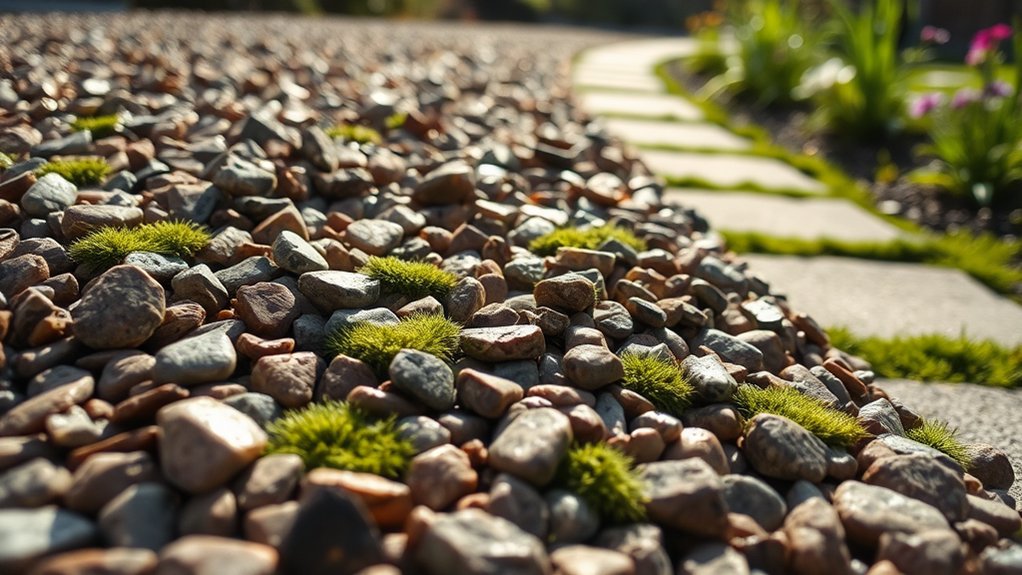
Resin-bound gravel typically lasts 15 to 25 years with proper care. Its durability depends mainly on installation quality, materials used and weather exposure.
Much like a good pair of boots, investing in premium resin and aggregates pays off in the long run, whilst cutting corners with cheaper materials often leads to problems. Regular upkeep is vital – simple tasks like sweeping and occasional pressure washing help maintain the surface. British weather can take its toll, particularly harsh sun and freezing conditions, which may cause the surface to deteriorate more quickly. High-quality resins can last up to 30 years, making them a worthwhile investment for those looking for long-term durability. Additionally, the installation of a professional base preparation is crucial to ensure the longevity of the surface.
Though more durable than loose gravel (think of the difference between scattered pebbles and a solid path), resin-bound surfaces mightn’t last quite as long as well-maintained block paving. To get the most from your resin-bound driveway or path, ensure professional installation and stick to a basic maintenance routine.
Think of it as you’d a garden fence – look after it properly, and it’ll serve you well for decades.
Importance of Proper Installation
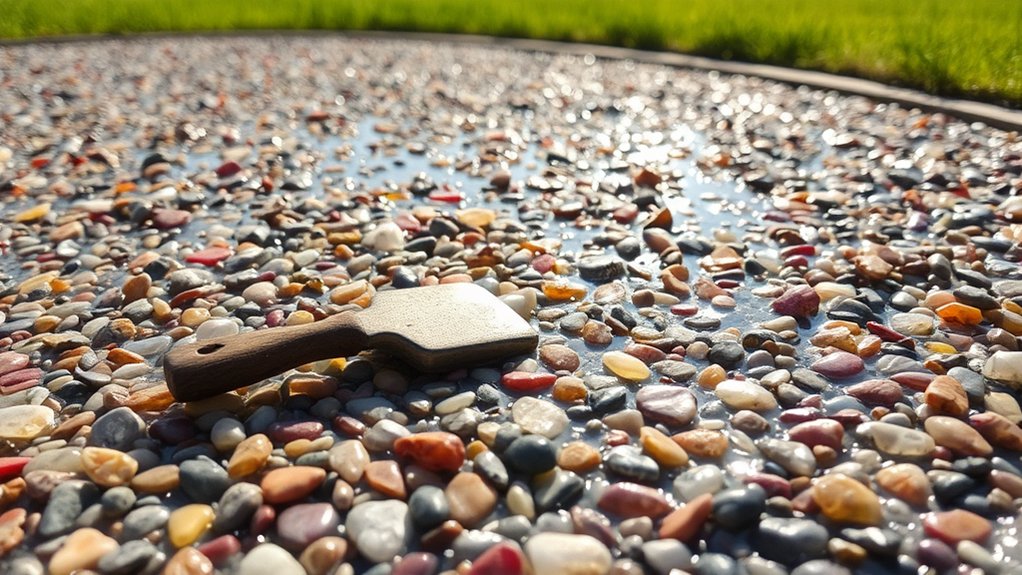
Proper Installation of Resin-Bound Gravel
The installation quality of resin-bound gravel directly affects how long it lasts and how well it performs. Poor installation often leads to early damage, much like laying paving slabs on uneven ground.
Essential steps for successful installation:
- Clean and level the existing surface thoroughly – think of it as preparing a cake tin before baking.
- Mix resin and aggregate in exact measurements (like following a recipe).
- Install only when temperatures are above 10°C, as cold weather affects how the resin sets. Ensuring a strong concrete base is crucial for the longevity of the installation. A well-prepared base is essential to prevent structural issues in the future.
A properly installed resin-bound surface should last 15-20 years, whilst rushed or incorrect installation might need repairs within months.
Quality of Materials Used
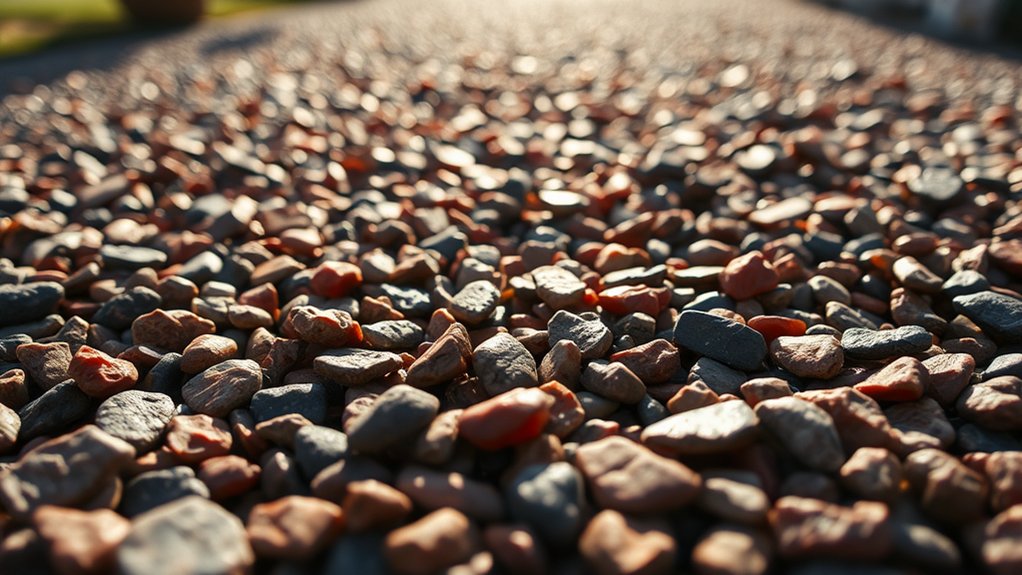
The quality of materials significantly impacts resin-bound gravel’s performance and lifespan. Premium aggregates ensure proper resin bonding, whilst high-grade resin determines overall durability. For best results, choose clean, uniformly-graded aggregates free from dust. UV-stable resins with robust bonding characteristics are vital. Additionally, using clean aggregates enhances the longevity of the Resin Bound surface. A proper mixing process also plays a critical role in achieving an optimal finish and durability.
| Material Aspect | Key Considerations | Impact on Longevity |
|---|---|---|
| Aggregate Cleanliness | Ensures proper resin bonding | Reduces failure risk |
| Aggregate Size | Uniform size boosts stability | Increases durability |
| Resin UV Stability | Prevents sun damage | Maintains appearance |
| Bond Strength | Affects surface durability | Extends lifespan |
| Weather Resistance | Handles British weather | Reduces upkeep |
Like choosing quality ingredients for baking, selecting premium materials for resin-bound gravel directly affects the end result. Poor-quality materials might save money initially but often lead to costly repairs down the line.
Effects of Environmental Exposure
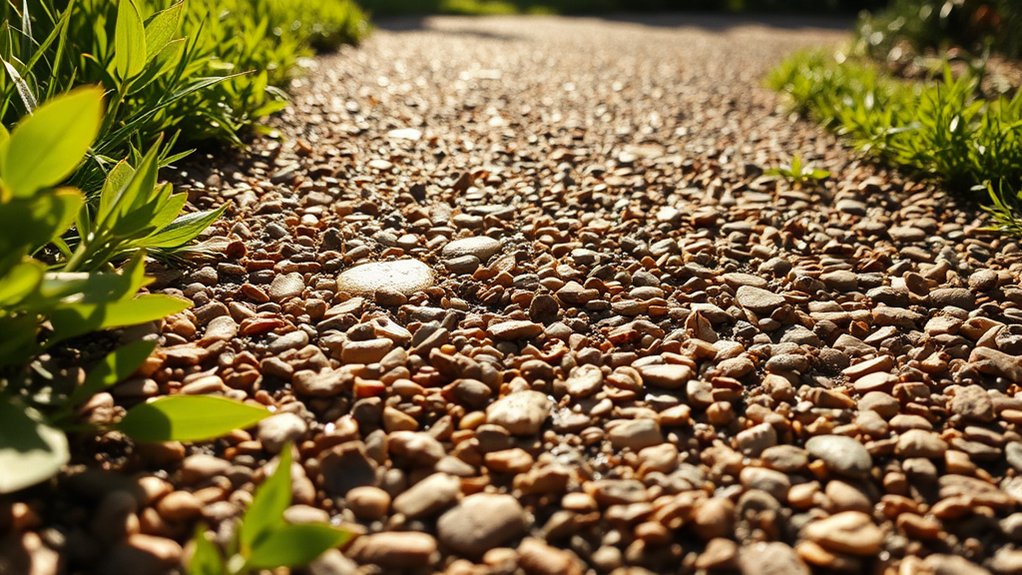
Environmental exposure significantly impacts resin-bound gravel surfaces across the UK, with our varied weather conditions playing a major role in their longevity.
British sunlight, despite being less intense than in warmer climates, can still cause resin to break down and colours to fade over time. Our frequent rain makes proper drainage absolutely crucial – without it, you’ll face water pooling and frost damage during winter months.
Essential considerations:
- UV-resistant materials are worth the investment, particularly for south-facing driveways
- Sound drainage prevents standing water, especially important during British winters
- Regular checks help spot problems before they worsen, saving money long-term
Think of it like caring for outdoor furniture – the better you protect it from the elements, the longer it lasts.
Key Maintenance Practices
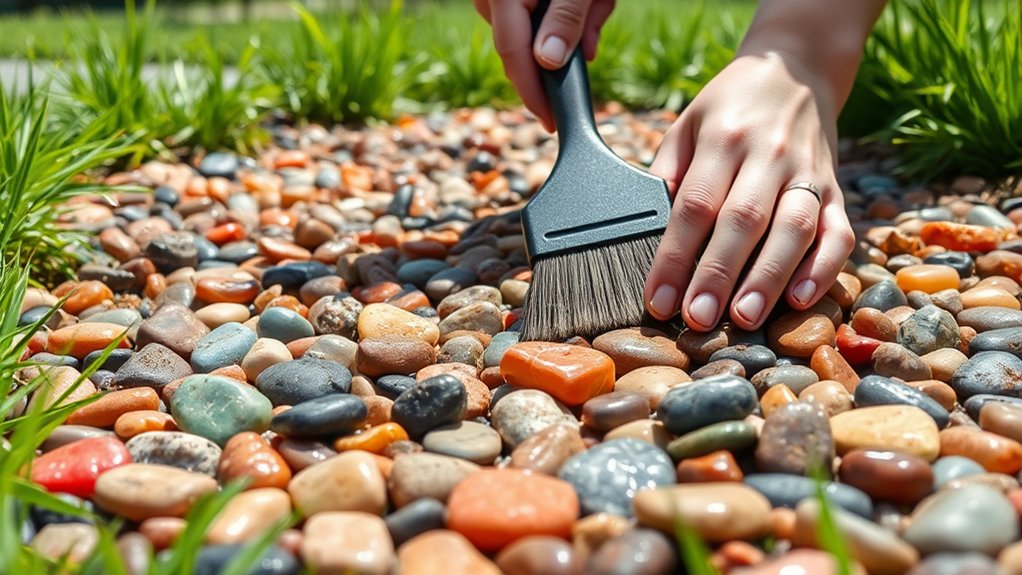
Regular upkeep of resin-bound gravel surfaces requires simple yet consistent cleaning.
Sweep weekly and hose down monthly to shift loose debris and dirt. In autumn, clear fallen leaves straight away to stop them staining the surface.
During winter, check drainage points more often to prevent water pooling. For best results, tackle spills quickly with warm soapy water and a soft brush – much like cleaning your patio.
A thorough clean twice yearly, particularly after winter, helps maintain the surface’s grip and appearance.
Regular Cleaning Schedule
Regular Cleaning Schedule for Resin-Bound Surfaces
A proper cleaning routine keeps resin-bound gravel looking smart whilst protecting your investment. Think of it like maintaining your car – regular attention prevents bigger problems later.
Essential cleaning routine:
- Weekly sweep with a stiff brush (more often during autumn for fallen leaves)
- Monthly thorough rinse with a garden hose
- Use gentle circular motions when sweeping, like cleaning your patio
Equipment needed:
- Stiff-bristled broom
- Garden hose
- Specialist resin cleaner for tough stains
For deeper cleans, a pressure washer on low setting works well, but don’t overdo it – too much pressure can damage the surface.
Tackle spillages straight away, just as you’d on your kitchen floor, to prevent staining.
Common UK weather means extra care during winter months when leaves and mud are frequent visitors.
A quick sweep after rain helps prevent moss build-up, particularly common in shaded areas.
Prompt Debris Removal
Regular clearing of debris is vital for maintaining resin-bound gravel surfaces across the UK.
Check your surface routinely for fallen leaves, twigs and general dirt, particularly in sheltered corners where it tends to collect. A stiff brush works best – sweep in circles to lift debris without damaging the resin coating.
We recommend weekly sweeps to stop dirt becoming trapped and causing unsightly stains.
After brushing, give the surface a gentle rinse with your garden hose. Don’t be tempted to use a pressure washer, as it’s likely to damage the resin.
These simple maintenance habits will keep your resin-bound gravel looking smart and lasting longer.
Quick tip: Areas under trees need more frequent cleaning, especially during autumn when leaves are falling.
Seasonal Maintenance Adjustments
Maintaining Seasonal Resin Surfaces
Regular cleaning forms the basis of proper seasonal upkeep. Different seasons require specific maintenance approaches to protect your resin-bound gravel.
- Winter: Choose plastic shovels for snow clearance. Clean off road salt and grit straight away to prevent staining.
- Spring: Check for damage and give surfaces a thorough clean to remove winter build-up. Ensure water drains properly.
- Autumn: Remove fallen leaves regularly to avoid staining. Look for any small repairs needed before winter arrives.
Installer Expertise and Its Impact
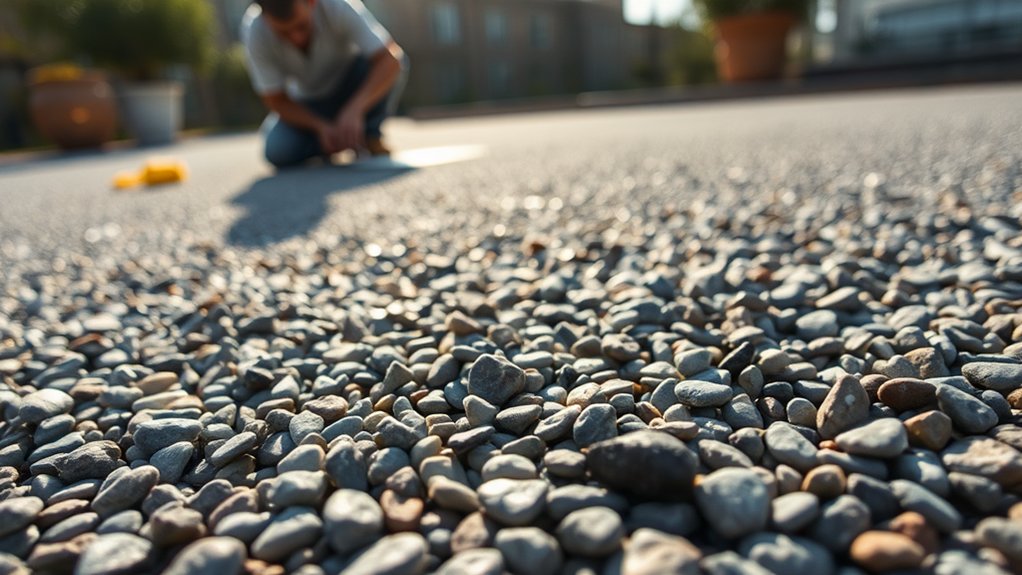
Choosing qualified contractors for resin-bound gravel makes all the difference to your project’s outcome.
Skilled installers know the critical details – from properly preparing the groundwork to mixing the correct resin ratios. Think of it like baking: just as a professional baker knows exactly how long to knead dough, expert installers understand precisely how to lay and finish your surface.
A well-installed resin-bound surface will last years longer than a poorly done job.
Professional contractors spot potential issues before they become problems and know how to work with Britain’s varied weather conditions. They’ll ensure proper drainage and a perfectly level finish – essential for our wet climate.
Bottom line: skilled workmanship is worth the investment for a durable, good-looking driveway or path.
Choosing Qualified Contractors
Choosing the Right Installers for Resin Bound Gravel
Getting your resin bound driveway or patio right starts with picking properly qualified installers. A good contractor should hold relevant certifications and have solid experience in resin installations.
- Technical Know-how: Qualified installers understand proper groundwork preparation and how to mix and lay resin correctly – crucial for a long-lasting finish.
- Materials: They’ll recommend the right stone and resin combinations for British weather conditions, whether it’s for a busy family driveway or a decorative garden path.
- Standards: Check they comply with UK building regulations and SUDS requirements – particularly important if you’re paving your front garden or driveway.
Ask to see examples of their previous work in your local area and check their trade memberships.
A proper installer won’t mind showing their credentials or providing references from recent customers.
Importance of Experience
Experience Is Key
Choosing skilled contractors is vital for quality resin-bound gravel installations, but proper experience truly makes the difference. Seasoned installers know exactly how to prepare surfaces, mix materials and lay the product correctly – skills that directly impact your driveway or patio’s longevity.
Think of it like baking: whilst anyone can follow a recipe, an experienced baker knows precisely how the ingredients should look and feel at each stage. Similarly, experienced resin installers understand how weather affects installation, how to prevent common issues like weak spots, and when conditions are right to begin work.
Their expertise typically comes with better warranties and fewer maintenance headaches down the line. Whilst you might save money initially with less experienced contractors, proper installation from qualified professionals often proves more cost-effective long-term.
When selecting installers, ask about their track record with similar projects and request to see examples of their work from at least two years ago. This will give you a proper sense of how their installations weather over time.
Techniques for Mixing and Laying
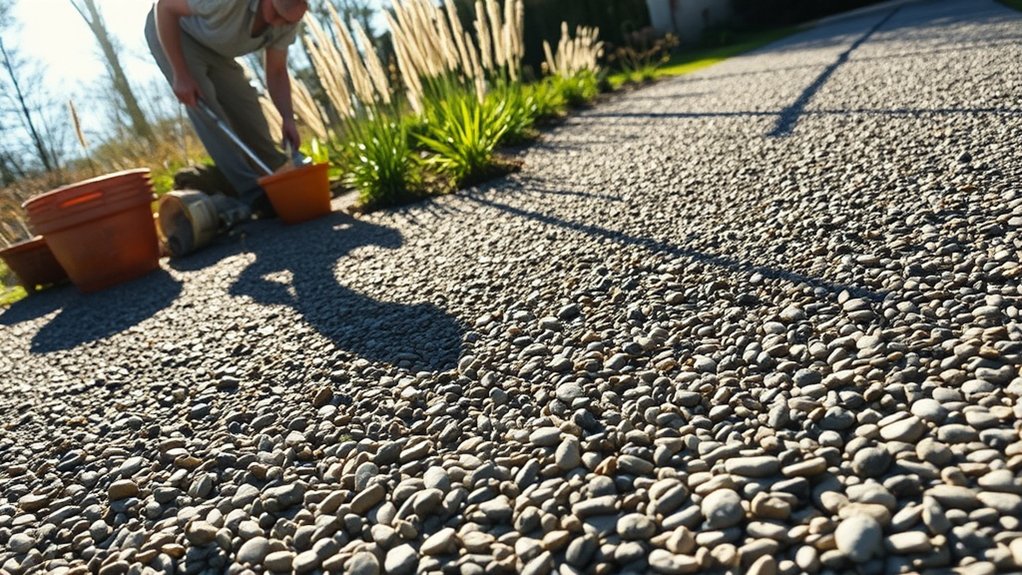
Mixing and laying resin-bound gravel demands precise attention to detail for lasting results. First, thoroughly clean the surface to ensure proper bonding.
Mix Part A and B components using a slow-speed mixer – you’ve got roughly 10-15 minutes before it starts setting, so work quickly but carefully.
When laying:
- Mark out a grid to keep distribution even
- Spread with a rake
- Compact with a whacker plate
Essential checks:
- Base must be solid and level
- Stick to manufacturer’s mixing ratios
- Surface must be clean and dry
These straightforward steps will help you achieve a proper finish that lasts. Think of it like icing a cake – get the foundations right, and the rest follows naturally.
Remember: Once mixed, there’s no going back, so make sure you’re properly prepared before starting each section.
Benefits of Regular Assessments and Repairs
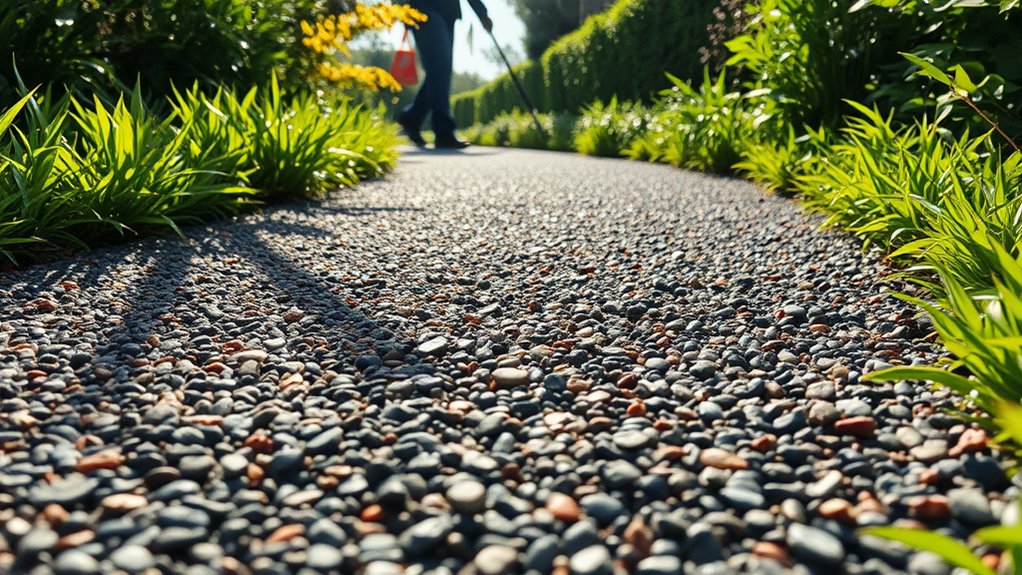
Regular assessments and repairs of resin-bound gravel surfaces are vital to protect your investment. A routine check every six months helps spot problems early, saving you money on major repairs down the line.
When issues crop up, like small cracks or loose stones, it’s best to sort them quickly using matching materials – much like fixing a chip in your car’s paintwork before it rusts.
Good maintenance keeps the surface safe and looking smart whilst preserving its water-draining properties. Think of it like servicing your car – regular attention prevents bigger headaches later.
Plus, a well-maintained surface boosts your property’s kerb appeal and value.
Key checks include:
- Looking for cracks or loose areas
- Testing drainage after heavy rain
- Checking edges where the surface meets other materials
- Spotting any colour changes or wear patterns
Comparison With Other Driveway Materials
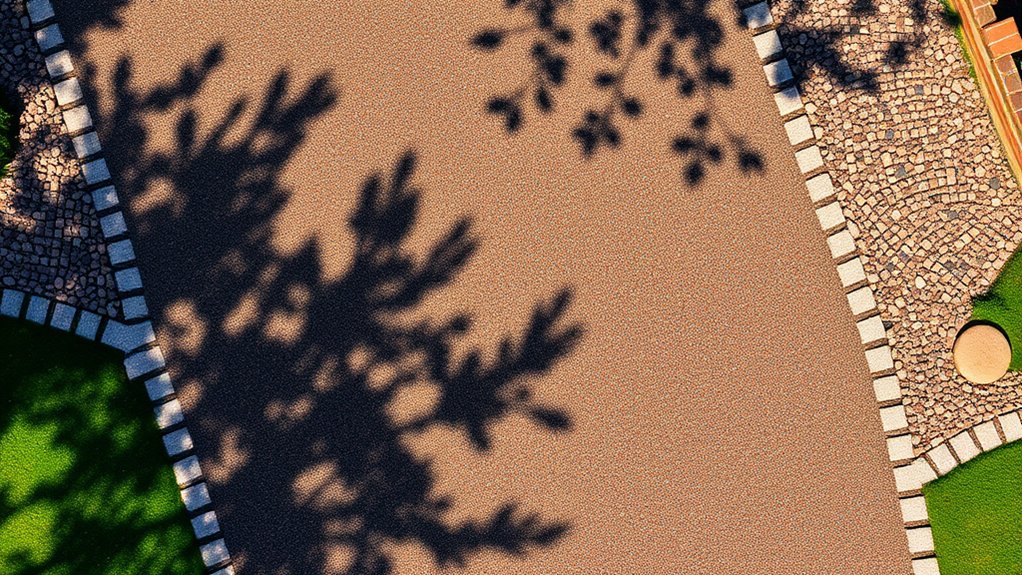
Comparing Driveway Materials
Resin-bound gravel offers a smart balance of durability and kerb appeal for UK homes. With proper care, it typically lasts 15-25 years, outperforming loose gravel which needs frequent topping up due to scatter and wheel tracks.
Key points:
- Creates a smooth, tidy finish that boosts property value
- Tougher than loose gravel but not as hardy as well-kept block paving
- Needs regular cleaning and resealing to maintain its condition
Unlike traditional gravel, which can be unstable and high-maintenance, resin-bound surfaces provide a sturdy, water-permeable option that withstands British weather and UV exposure.
Think of it as a middle ground between basic gravel and premium block paving – ideal for homeowners seeking a practical yet attractive driveway solution.
Environmental Advantages of Resin-Bound Gravel
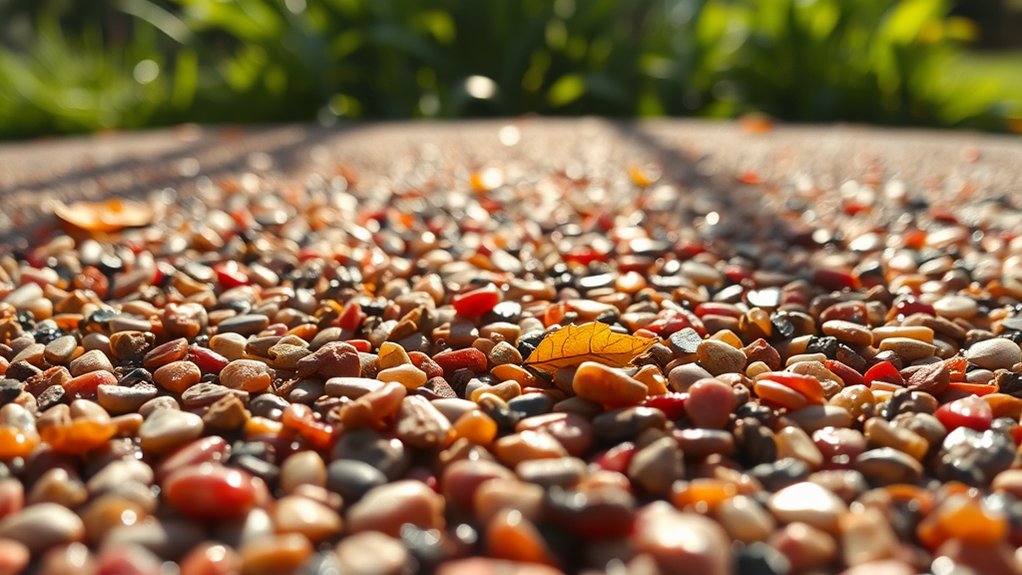
Resin-bound gravel offers remarkable benefits for sustainable drainage across UK properties.
Its porous structure allows rainwater to filter naturally through to the ground below, rather than flooding driveways or overwhelming local drainage systems. This helps reduce surface water during Britain’s frequent wet spells whilst topping up natural groundwater levels.
The materials used are increasingly eco-friendly, with many suppliers now offering options made from recycled components – perfect for environmentally conscious homeowners looking to upgrade their driveways.
Sustainable Drainage Solutions
Resin-bound gravel stands out as a practical drainage solution for UK properties, offering excellent water absorption whilst helping prevent local flooding. This permeable surface fits perfectly with British weather conditions and planning requirements.
- Naturally filters rainwater back into the ground, maintaining healthy soil levels
- Meets UK SUDS regulations for sustainable drainage
- Creates better conditions for garden plants and wildlife
The system works particularly well for British driveways and garden paths, where heavy rainfall often leads to puddles and waterlogging.
Unlike traditional concrete or tarmac, resin-bound surfaces handle typical British downpours without creating surface water issues.
Eco-Friendly Material Usage
Resin-bound gravel offers both kerb appeal and environmental benefits, making it a smart choice for modern British gardens and driveways. The system uses recycled materials, cutting down on new aggregate mining whilst creating a lasting surface that needs little upkeep.
Its water-permeable nature helps prevent flooding and allows rainwater to filter naturally into the ground, particularly useful given the UK’s wet climate. This drainage system supports local wildlife and plant life, whilst helping to maintain clean water systems.
| Eco-Friendly Benefits | Impact |
|---|---|
| Recycled Materials | Reduces landfill waste |
| Natural Drainage | Prevents local flooding |
| Pollution Filtration | Keeps waterways clean |
| Reduced Energy Use | Saves resources |
Installing resin-bound gravel is a practical investment that combines environmental responsibility with improved property value – particularly relevant as UK homeowners increasingly prioritise sustainable building materials.
Frequently Asked Questions
Can Resin-Bound Gravel Be Installed Over Existing Surfaces?
Resin-bound gravel works brilliantly over existing surfaces, but you must get the prep work spot-on. Think of it like painting a wall – the surface needs to be clean, crack-free and completely stable. For best results, tackle any repairs first and ensure the base is properly dried out. Common surfaces like concrete and tarmac make ideal foundations, much like building a house on solid ground.
What Color Options Are Available for Resin-Bound Gravel?
Resin-bound gravel comes in a wide range of colours, from rich reds and warm browns to contemporary greys and classic neutrals. The colour options let you match existing garden features or create striking contrasts for driveways and pathways. Popular choices amongst UK homeowners include natural stone colours like Cotswold buff and slate grey, whilst bolder options such as terracotta and golden quartz work brilliantly for feature areas.
Is Resin-Bound Gravel Suitable for Icy Conditions?
Resin-bound gravel performs reasonably well in icy conditions, though care is still needed. The textured surface provides decent grip, similar to standard pavements, but like any outdoor surface, it can become slippery when frozen. Regular winter maintenance, including gritting when temperatures drop below zero, helps keep the surface safe. Avoid using rock salt, as this may damage the resin binding – opt instead for non-corrosive ice melts designed for decorative surfaces.
How Does Resin-Bound Gravel Handle Heavy Vehicle Traffic?
Resin-bound gravel performs adequately under normal car and van traffic but isn’t ideal for heavy goods vehicles (HGVs) or lorries. To cope with heavier vehicles, like delivery vans or waste collection trucks, you’ll need a properly laid sub-base of at least 150mm and expert installation. Think of it like laying a proper foundation for a house – skimping on the groundwork could lead to cracks and dips in your driveway over time.
Can I Apply a New Layer to an Old Resin Driveway?
Applying a new layer to an old resin driveway isn’t typically recommended. Poor adhesion between layers often causes peeling and cracking, leading to costly repairs. Before considering any overlay work, have your existing driveway professionally assessed to determine the most suitable course of action.
Conclusion
Resin-bound gravel offers excellent value when properly installed and maintained. A well-laid surface can serve your property for 15-20 years or more, making it a sensible investment for British homeowners. Quality materials and professional installation are crucial – much like choosing a reliable builder for your extension. Regular maintenance, including simple sweeping and occasional pressure washing, helps protect your investment. Think of it as you would your car’s MOT – routine care prevents costly problems later. Choose this surface type for a durable, attractive driveway that stands up to our British weather whilst adding kerb appeal to your home.
